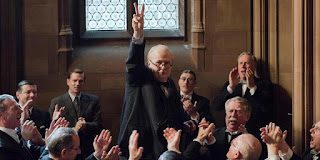Sunday, 7 January 2018
Movie Review: Darkest Hour (2017)
A biographical character study, Darkest Hour captures a leader rising to the challenge. Primarily a celebration of Gary Oldman's acting in the role of Winston Churchill, the film otherwise traverses overly familiar historical territory.
It's May 1940, and with the Nazis sweeping across Europe, the British Parliament loses confidence in Prime Minister Neville Chamberlain (Ronald Pickup). His conservative party reluctantly replaces him with the abrasive Winston Churchill (Gary Oldman), a decision that underwhelms King George VI (Ben Mendelsohn). Churchill's new secretary Elizabeth Layton (Lily James) bears the brunt of his acerbic attitude.
Despite the encouragement of his wife Clementine (Kristin Scott Thomas), Churchill is aware that he has achieved his life's ambition at the worst possible time: France is capitulating, Belgium and Holland cannot withstand the Nazi assault, and the British army is falling back to Dunkirk, their backs to the water with the Navy seemingly helpless to mount a rescue. With members of his cabinet arguing for a negotiated but humiliating peace, Churchill has to define a position for his fractured government and chart his nation's course through history.
Directed by Joe Wright, Darkest Hour zooms in on Churchill's first month in office. The film delves into the psyche of a man thrust into the most difficult leadership position in the free world at age 66, as western civilization crumbles under the boot of fascism and the United States stubbornly holds on to a policy of non-involvement. Churchill only became Prime Minister due to his well-known and uncompromising hatred of Hitler, and yet here he was in a position of power and being advised to sue for peace.
Wright centres the film on this deeply personal dilemma, with Churchill isolated from his own party and disconnected from the people, forced to make a literally existential decision days into his mandate. The film uses its artistic license to dramatize some pivotal moments, and Wright makes good use of a (more than likely) imagined turning point on the London subway system.
Darkest Hour touches on the actual events of the raging war with a light brush. A couple of artistically rendered scenes convey a taste of events in France, as Churchill comes to grips with an army in full retreat and the enormous responsibility of issuing orders that cost human lives. But most of the film takes place in London, in Churchill's home and in his war bunker, with Wright limiting his scope to the political, personal and national calculus going on in his head.
The film is therefore primarily composed of Churchill's often verbose conversations with his wife, his political rivals, and the King. Patience is required as the machinery of government under Churchill kicks into gear and he comes to terms with his available options. Wright tries to flesh out the drama with some pointed contributions from wife Clementine, the still-influential Chamberlain, other politicos including Lord Halifax (Stephen Dillane), secretary Layton (representing the common people) and the King, but they remain fleeting characters who barely progress beyond the most basic definitions.
An intensely personal drama demands an immersed central performance, and Gary Oldman delivers in the role of his career. Under layers of makeup, Oldman disappears into the Prime Minister and dominates the screen, humanizing the man behind the myth as burly and boorish but conflicted, not yet having hit his stride but clearly possessing an enormous if stubborn heart.
With the destination of the film never in doubt and the secondary characters not much better than window dressing, Oldman is the one reason Darkest Hour works.
All Ace Black Blog Movie Reviews are here.
Labels:
Ben Mendelsohn,
Gary Oldman,
Kristin Scott Thomas,
Lily James
Subscribe to:
Post Comments (Atom)




No comments:
Post a Comment
We welcome reader comments about this post.